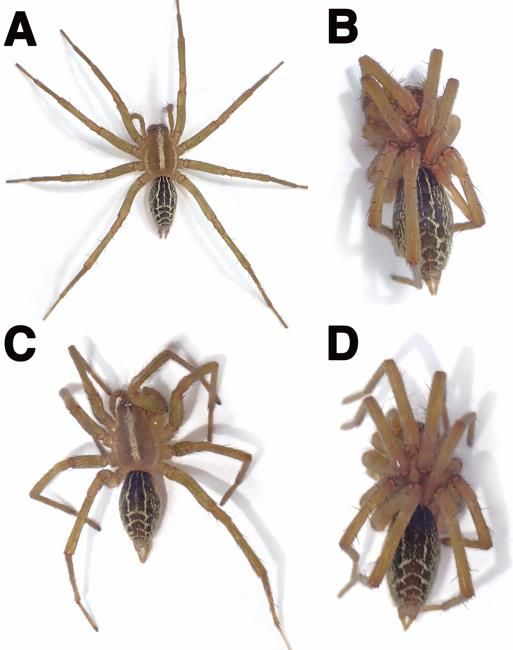Mating can be risky, especially if you're just a wee male spider.
In many species, the female – often larger and more intimidating than any potential wooer – finishes the act of copulation by enjoying her mate as a tasty post-coital meal.
So a male often has to decide between biological imperatives: survival or procreation. Procreation usually wins, resulting in… well, welcome to snack-town, buddy.
Many spiders have developed defensive strategies to avoid this unpleasant fate, such as launching at speed away from the female as soon as mating is complete or wrapping her in silk to prevent her from attacking. But funnel-web spiders of the species Aterigena aculeata, native to China, take a different tack.
As new research explains, females of the species signal their safety and receptiveness as a mating partner by curling up and playing dead, allowing males to approach, mate, and scuttle away again without coming to harm at their fangs.
"Sexual catalepsy of females in the funnel weaving spiders may deliver a sexual-receptive signal to the courting males and thereby benefit both the signal senders and receivers," writes a team of researchers led by Jihe Liu of Jinggangshan University in China.
"Therefore, sexual catalepsy in A. aculeata may not reflect a conflict but rather a confluence of interest between the sexes."
Playing dead, also known as tonic immobility or thanatosis, is a well-known strategy for predator evasion in the animal kingdom, and many animals engage in it.
Since most predators only seek live prey, keeling over and presenting what appears to be an already deceased target can be an effective way of getting out of an extremely threatening situation.
In this state, animals can remain conscious of their surroundings but can slow their heart and breathing rates to mimic death better.
Several species of funnel-weaving spiders have also been recorded entering what appears to be a thanatosis-like state for mating over the years, but what drives it has been difficult to ascertain.
"Experimental evidence suggests that sexual catalepsy is a male-induced mechanism to reduce the risk of sexual cannibalism," the researchers explain.
"Females may remain motionless and unresponsive for between a few minutes to several hours, during which time the courting male can move the female into a position that allows him to insert his pedipalps, without risk of attack."
However, it's not clear that this represents a strategy on the part of the male. So Liu and his team collected some spiders and observed their reproductive activity in several situations in the lab.
The spiders were collected one month before their normal mating season, and researchers kept them in individual containers, feeding and tending them.
The female spider was put in an observation chamber; after she had constructed a web, the male was placed in the chamber with her so the pair could mate as they usually would in the wild.
In nine of these 12 observed pairings, the female entered sexual catalepsy, laying still and curling her legs up as though dead. These cases resulted in successful mating. For the three remaining cases, the male made overtures, but the female remained alert and normal, so mating did not take place.

Next, the researchers induced catalepsy-like states in six fresh females by introducing males. They induced thanatosis by gently shaking the six other females in a test tube to scare them until they became immobile.
The remaining group of females was anesthetized to mimic what might occur if the chemical signal from a male spider had induced catalepsy.
The researchers then froze the three groups of six spiders with liquid nitrogen, ground them up, and examined the powdered spiders. They wanted to study the chemistry of what was going on inside the spiders when they were conked out. A control group of regular, conscious female spiders was also included.
The results showed that the state of sexual catalepsy was most chemically similar to thanatosis, implying that female spiders choose to play dead to mate. This is consistent with what the researchers observed: The female spiders usually resume activity pretty much as soon as mating is concluded, while the male leaves.
None of the observed mating attempts – even the unsuccessful ones – resulted in arachnid cannibalism. However, the behavior may be a means whereby the female spiders can choose who they wish to father their spiderlings.
"While female sexual catalepsy might initially seem to reflect a case of male-controlled sexual conflict, our experiments suggest that it is under female control and benefits both females and males," the researchers write.
"Perhaps sexual catalepsy allows females to exercise some choice in mating partner: initially, females remain potentially aggressive to courting males, remaining that way to non-preferred males and adopting sexual catalepsy to males that are able to touch the female."
Who said romance was dead?
The research has been accepted in Current Zoology.
